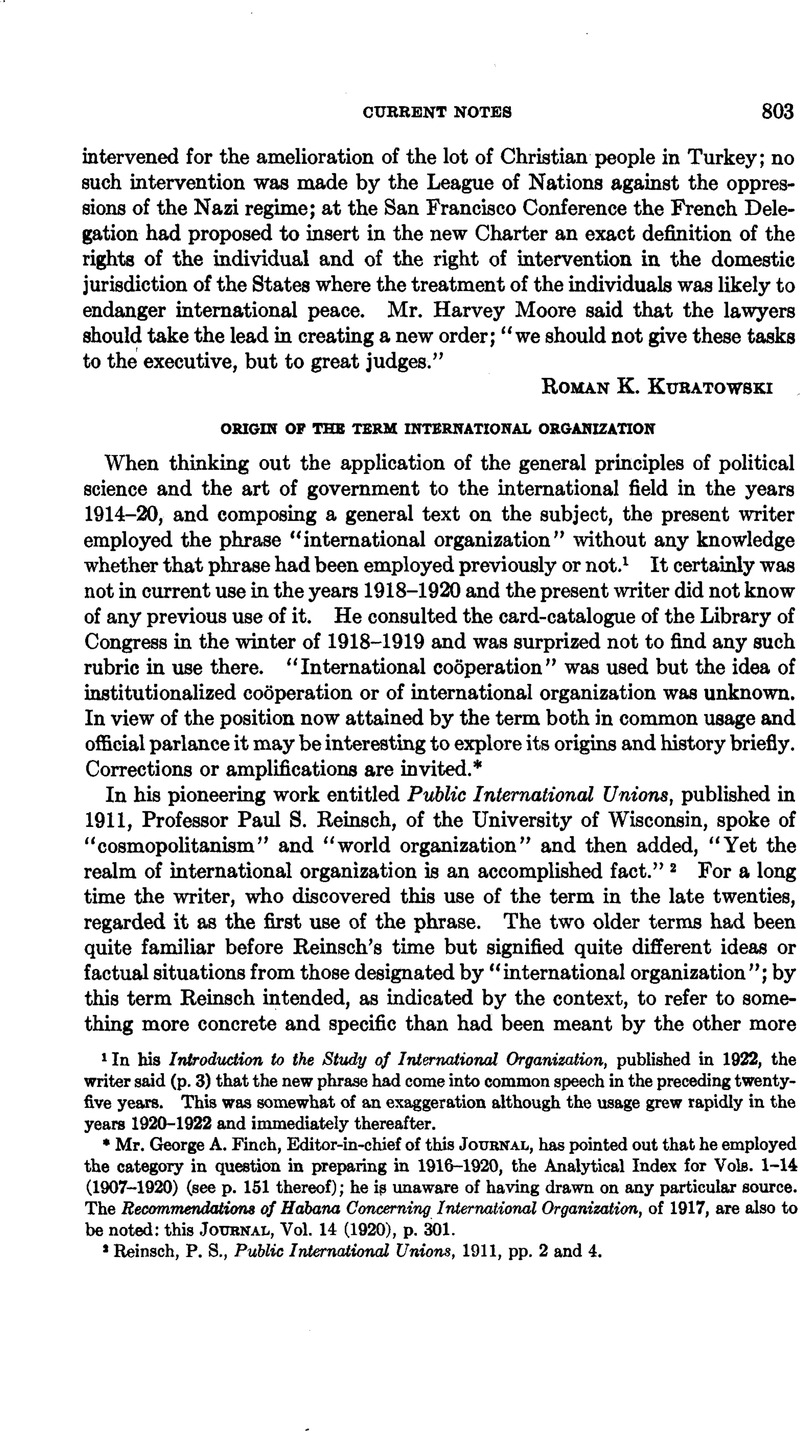Article contents
Origin of the Term International Organization
Published online by Cambridge University Press: 25 April 2017
Abstract

Information
- Type
- Current Notes
- Information
- Copyright
- Copyright © American Society of International Law 1945
References
1 In his Introduction to the Study of International Organization, published in 1922, the writer said (p. 3) that the new phrase had come into common speech in the preceding twenty five years. This was somewhat of an exaggeration although the usage grew rapidly in the years 1920-1922 and immediately thereafter.
2 Reinsch, P. S., Public International Unions, 1911, pp. 2 and 4.
3 P. 10.
4 Die Friedens-Warte, May, 1910, p. 84, col. 1. For much of the material in this note, specifically the reference to Lorimer, below, I am indebted to my friend and former colleague Professor Hans Wehberg, scholarly and indefatigable editor of Friedens-Warte now since many years.
5 Same, col. 2.
6 P. 81.
7 P. 89.
8 Die Zukunft, edited by Maximilian Harden, August 17, 1907, cited in correspondence by Wehberg.
9 In French in Revue Generale de Droit Internationale Publique, Vol. XV (1908), p. 1, and in German in Staatsrechtliche Abhandlungen, Festgabe für Paul Laband, Tubingen, 1908, p. 535; the German version is greatly expanded in comparison with the French although they are obviously more or less the same paper.
10 Juristische Bläitter, publication of the Juristiche Gesellschaft zu Wien, Vol. 36, No. 44 (Nov. 4, 1907), p. 521. For this reference I am indebted to my friend and former colleague Professor Kelsen, sometime member of the Juristiche Gesellschaft.
11 Transactions of the Royal Society of Edinburgh, Vol. XXIV (1867), p. 557, cited in Jacob ter Meulen, Der Gedanke der Internationalen Organisation, 1917-1940, Vol. II, Pt. 2, p. 207, note 2. On Lorimer's position in the field of international law and organization in general see Jenks, C. W., “The Significance today of Lorimer's Ultimate Problem of International Jurisprudence,” in Grotius Society, Transactions, Vol. 26 (1940), p. 35.
12 Revue de Droit International et de Législation Comparée, Vol. III (1871), p. 1, at p. 4.
13 Thomas Willing Balch, International Courts of Arbitration, 1912 (fourth edition), pp. 31, 41.
14 The Institutes of the Law of Nations, Vol. II, 1884, pp. 190, 216, etc.
15 Under the title Principles de Droit International; published also in Paris.
16 Lorimer's phrase was frequently used by Constantin Franz in 1878-82 (Fdderalismus als . . . Prinzip für … Internationale Organization, 1879): ter Meulen, Vol. II, Pt. 2, p. 15, and correspondence with Dr. Laslo Ledermann, Geneva.
17 Lorimer even proposed “International Government“: work cited, p. 279.
- 9
- Cited by

